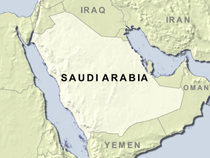Cairo
28 May 2009
 |
U.S. ties with Saudi Arabia go back to the founding of the Saudi Kingdom in the 1930s, and were strengthened with the discovery of oil by a U.S. company several years later.
Saudi Arabia became a key U.S. ally during the Cold War, and despite brief periods of rocky relations, has kept close ties with the United States ever since.
President Barack Obama's visit to Saudi Arabia is being seen by many analysts as an opportunity to renew those ties, as well as to address many mutual concerns, including Iran, the Arab-Israeli conflict, and the global economic crisis.
Saudi King Abdullah came to power in August 2005, after the death of his half-brother King Fahd. Abdullah was reputed to be a man of the people, and a proponent of reform.
King Abdullah found himself locked in a vicious insurgency against al-Qaida terrorists and has cracked down on them in recent years, restoring order, for the most part.
The Saudi monarch describes his fight against al-Qaida:
"A small band of criminal terrorists," he says, "is spoiling our relations with others and is defiling the image of Islam and of Muslims. It is up to us," he argues, "to combat that band, put them out of business and build relations with others based on sound logic ..."
King Abdullah carries a great deal of clout in the Arab and Islamic world, and as Paul Salem, the director of the Carnegie Center for Peace in the Middle East, points out he is a key to improving U.S. relations with Arabs and Muslims.
"King Abdullah in Saudi Arabia is a major player on three fronts: one front is the general Islamic world; Saudi Arabia hosts the Organization of the Islamic Conference and is the site of Mecca and Medina, so it is an important player in Obama's attempt to repair relations with the Muslim world and the Arab world," Salem said.
Salem also stresses economy and security issues are likely to be at the center of discussions between Mr. Obama and the king.
"Saudi Arabia is a main player on Gulf issues, Gulf security, oil and tensions with Iran, so I am sure there is a lot to talk about there. ... Saudi Arabia is the one that tabled the Arab peace initiative [in 2002], and is a main player in the Arab-Israeli peace process. In addition, Saudi Arabia is also a main player in the global economic crisis that the United States is going through," Salem said.
Editor Khaled al-Maeena, of the Saudi English-language daily Arab News, thinks Saudis would like to tell Mr. Obama a number of things.
"The first thing the Saudis would want to tell him is that there should be an even-handed U.S. policy, a more clear approach to the issues of the Middle East, and that includes the total Middle East, Palestine and then the Gulf, and even as far as Pakistan is concerned," al-Maeena said.
Al-Maeena also thinks that Saudis would like to ask Mr. Obama to correct what they perceive as the "mistakes" of the Bush administration, such as dealing with sheikhs and princes and potentates, while ignoring the common man.
"Remember one thing: the United States at the time of the Bush administration had made a mistake: they would deal with oil-rich sheikhs and potentates, but they did not deal with the masses and had no idea of the aspiration of the masses, which they just judged as extremists," al-Maeena said. "There is a constituency in the Arab world, there are people who would really like to be treated with dignity; there are people who would want friends and not masters, and I think Obama should realize this."
Al-Maeena also stresses that Saudi King Abdullah is a wise man and that President Obama could learn from him.
"Obama is fortunate to talk with the king. King Abdullah is a man of few words, but he says what he means and means what he says, and I think it is very important for Obama to listen to a man who has been in Arab politics, and who cares for the people," al-Maeena said.
U.S. ally Israel is also looking at the Obama-Abdullah meeting with interest, according to analyst Meir Javedanfar of the Middle East Economic and Political Analysis Center in Tel Aviv.
"The Israeli government sees Saudi Arabia, alongside Jordan and Egypt as a front against Iran. So, the stronger the relations between Washington and Riyadh are, the more Israel hopes that America can pressure the Saudis to confront the increase of Iranian influence in the Middle East," Javedanfar said.
Saudi Arabia has long been seen as a political counter-weight to Iran in the Gulf region and its relationships in the Middle East gives it the ability to temper various regional conflicts.